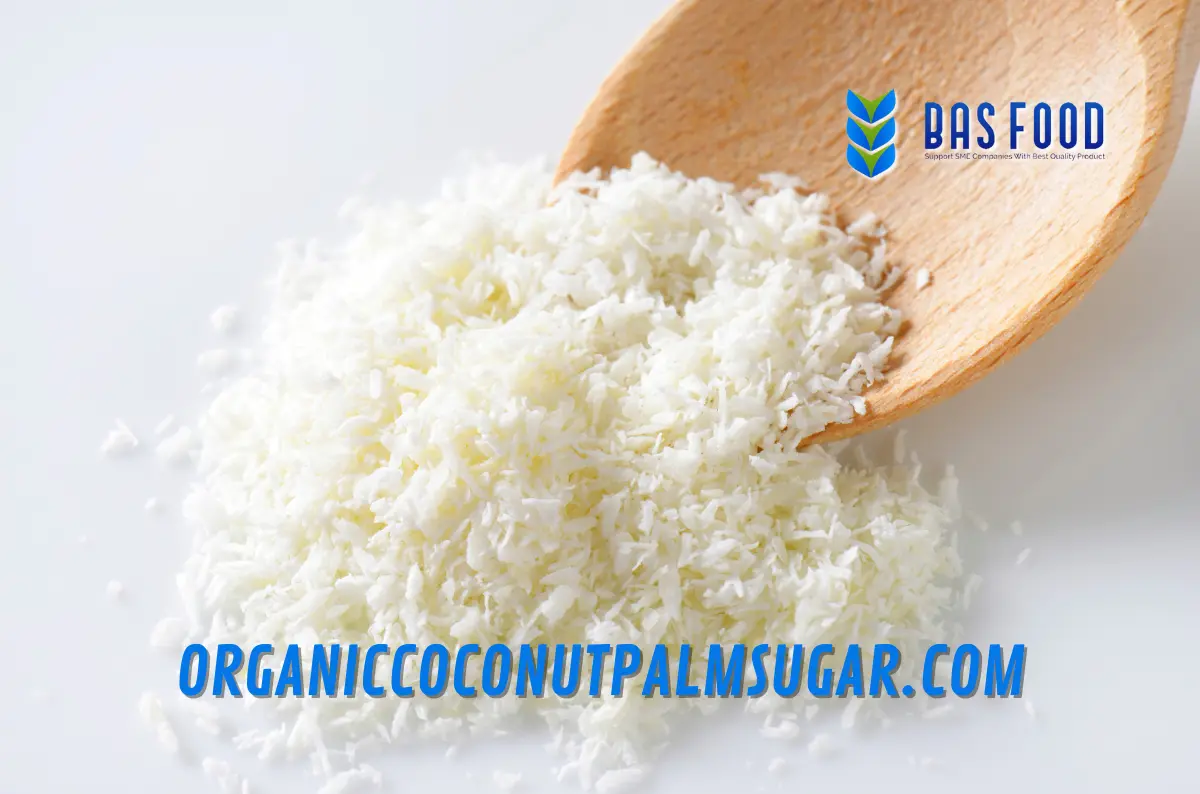Indonesia is not only the world’s largest archipelago but also one of the biggest producers of coconut and coconut-based products. Among these, desiccated coconut Indonesia has gained a remarkable reputation for its quality, purity, and versatility in global markets. This dried, finely grated white kernel of mature coconuts has become a vital export commodity, fueling the food, confectionery, and cosmetic industries worldwide.
But what made Indonesia stand out in this competitive global trade? From the fertile soils of Sulawesi to the coconut-dense lands of North Sumatra, the nation’s Indonesian coconut industry thrives on natural abundance, skilled labor, and an increasingly sustainable production model. Let’s dive into how Indonesia rose to prominence as a global desiccated coconut leader — and why it continues to shape the future of tropical exports.

The Rich Roots of Indonesia’s Coconut Industry
Centuries of Coconut Cultivation
Coconut trees have been deeply rooted in Indonesian life for centuries. The country’s tropical climate — warm, humid, and coastal — provides the perfect environment for coconut palms to flourish. Farmers across thousands of islands have long relied on coconuts for daily sustenance, building materials, and trade goods.
The Indonesian coconut industry evolved naturally as the demand for processed coconut products grew globally. Early exports focused on copra (dried coconut meat), but over time, the industry expanded to include value-added products like coconut oil, coconut milk, and eventually desiccated coconut.
From Tradition to Modern Industry
The shift from traditional coconut farming to industrial-scale production came with modernization in processing technology. Local producers began adopting hygienic drying systems, stainless-steel equipment, and standardized quality control measures that meet international food safety standards.
This modernization helped Indonesia secure its place as one of the top exporters of desiccated coconut to countries like the United States, Europe, and the Middle East.
Desiccated Coconut Indonesia: Why It Stands Out
Natural Quality and Purity
Indonesia’s desiccated coconut is known for its snow-white color, sweet aroma, and high oil content — characteristics that make it ideal for bakery, confectionery, and food manufacturing. Producers prioritize coconuts harvested from naturally grown trees, often using minimal chemicals and fertilizers.
The unique geographical conditions — fertile volcanic soil and consistent rainfall — contribute to the superior taste and nutritional profile of the product. This makes desiccated coconut Indonesia one of the most sought-after commodities in the global market.
Diverse Grades and Applications
Indonesian manufacturers offer various grades of desiccated coconut, from fine to medium to flakes, catering to diverse industries. The product’s versatility extends from bakery ingredients to confectionery coconut toppings, chocolate coatings, and even plant-based snacks.
Its long shelf life and nutritional benefits have made desiccated coconut a staple in health-conscious markets, especially in Europe and North America.
Coconut-Producing Regions in Indonesia: A Nationwide Strength
Top Regions for Coconut Cultivation
Indonesia’s coconut production is spread across multiple provinces, each contributing uniquely to the national output. The main coconut-producing regions include:
- North Sulawesi – Known for its large-scale desiccated coconut factories and export hubs.
- North Sumatra – Famous for its fine-grated coconut used in premium bakery and confectionery.
- Central and East Java – Ideal for smallholder coconut processing and organic production.
- Riau and Lampung – Strong contributors to coconut oil and copra, supporting desiccated coconut industries.
These regions combine to create a resilient supply chain that ensures consistent export volume and quality.
Local Farmers and Export Collaboration
Indonesia’s success also depends on the close relationship between coconut farmers, cooperatives, and exporters. Many factories source their coconuts directly from local communities, promoting fair trade practices and supporting rural livelihoods.
This collaboration model has created a more inclusive, sustainable ecosystem for desiccated coconut Indonesia, aligning local benefits with global demand.
Coconut Export Potential: The Future Is Bright
Strong Global Demand
The demand for desiccated coconut has skyrocketed over the past decade, thanks to the growing popularity of plant-based diets, gluten-free baking, and vegan snacks. Indonesia, being a reliable source of organic and conventional varieties, continues to attract buyers from around the world.
Countries such as the United States, the Netherlands, Germany, and South Korea are major importers of Indonesian coconut products. The nation’s competitive pricing and consistent quality make it an attractive alternative to the Philippines and Sri Lanka.
Expanding Product Range
Exporters have also diversified their coconut offerings, adding value-added products such as coconut milk powder, coconut flour, and coconut oil. This synergy strengthens the entire Indonesian coconut industry, positioning it as a one-stop source for everything coconut.
With strategic marketing and sustainable farming, Indonesia’s export potential is expected to grow even further in the coming years.
Sustainability in Desiccated Coconut Production
Eco-Friendly Coconut Farming
Many desiccated coconut Indonesia producers are now transitioning toward sustainable and eco-friendly coconut farming. These practices emphasize soil health, organic composting, and the avoidance of harmful pesticides. By doing so, farmers protect both the environment and the long-term productivity of their coconut plantations.
Moreover, initiatives that promote agroforestry — integrating coconut trees with other crops — help improve biodiversity and reduce carbon emissions.
Organic Coconut Processing and Waste Utilization
Sustainability extends beyond farming. In modern processing facilities, organic coconut processing techniques reduce water and energy waste. Meanwhile, by-products such as coconut shells and husks are reused for coconut waste utilization — transformed into activated carbon, coir fiber, or natural fertilizers.
This zero-waste approach strengthens Indonesia’s global image as a responsible, environmentally conscious producer.
Challenges and Innovations in the Coconut Industry
Competition and Climate Challenges
Despite its strengths, the Indonesian coconut industry faces stiff competition from neighboring countries like the Philippines and India. Climate change also poses risks, including unpredictable rainfall and pest outbreaks that can affect yield.
However, the government and private sectors are investing in research and development to address these issues. Improved seed varieties, irrigation systems, and training programs for farmers aim to secure the industry’s future.
Technological Advancements
On the brighter side, innovation is rapidly transforming the industry. Modern drying technology, automated grading systems, and digital export platforms have improved efficiency and traceability.
With these advancements, desiccated coconut Indonesia producers can meet international standards while maintaining high quality and consistency.
CV Bonafide Anugerah Sentosa: A Trusted Indonesian Supplier
A key player contributing to this success story is CV Bonafide Anugerah Sentosa, a reliable exporter of coconut products, spices, fishery goods, and green coffee from Indonesia. The company operates with a strong commitment to quality, sustainability, and partnership.
As a trusted coconut supplier and producer, CV Bonafide Anugerah Sentosa provides desiccated coconut Indonesia that meets global food safety certifications. Their integrated approach — from sourcing coconuts directly from farmers to ensuring eco-friendly processing — reflects Indonesia’s vision for a sustainable coconut future.
For buyers seeking dependable and high-quality coconut products, Bonafide Anugerah Sentosa represents the excellence and reliability that have made Indonesia a true coconut powerhouse.
Conclusion: Indonesia’s Coconut Legacy Continues
Indonesia’s journey to becoming a leader in desiccated coconut production is a testament to its natural resources, cultural heritage, and global-minded innovation. From fertile farms to modern export facilities, every step in the supply chain contributes to the nation’s standing as a tropical superpower.
As sustainability and innovation continue to drive progress, desiccated coconut Indonesia will remain at the heart of global trade — a product that embodies both tradition and modern excellence.
Contact CV Bonafide Anugerah Sentosa how we can provide the best solutions for you. WhatsApp: +62 8213 4505 737, Email: info@bonafideanugerahsentosa.com / bas.mdir@gmail.com.

